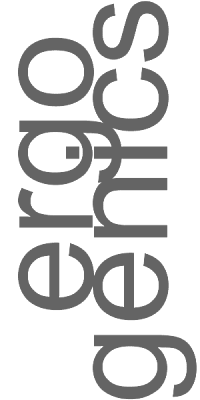 |
|
Behoefte aan meer energie? Neem een placebo!
Als je wat meer energie kunt gebruiken, neem dan gerust een placebo. Je zult er energieker door worden, ook al zitten er geen actieve stoffen in die dingen. En ook als je ervan overtuigd bent dat zo'n stomme psychologische truc bij jou niet zal werken, kun je er toch baat bij hebben. Dat blijkt uit een studie die onderzoekers van de University of Alabama at Birmingham in de VS publiceerden in Scientific Reports.

Studie
De proefpersonen wisten dat ze placebo's gebruikten. De onderzoekers hadden ze uitgelegd dat er geen actieve stoffen in placebo's zitten, en dat ze zich afvroegen of de proefpersonen door het placebo-effect meer energie zouden krijgen.
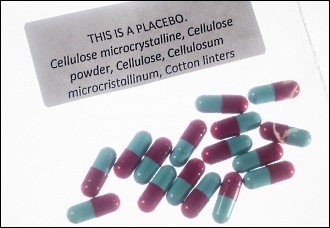
Voor en vlak na de experimentele periode bepaalden de onderzoekers aan de hand van vragenlijsten de vermoeidheid van de proefpersonen.
Resultaten
De staafdiagrammen laten zien met hoeveel punten in de periode van 3 weken de scores voor vermoeidheid [links] of de mate waarin vermoeidheid de levenskwaliteit verminderde [rechts] afnamen. Zoals je ziet was die afname groter in de placebogroep.
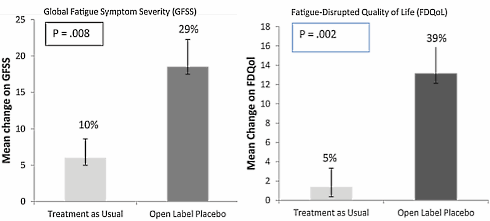
Een week nadat de eerste experimentele periode was afgelopen, begon de tweede fase van het experiment. De voormalige placebogroep slikte gedurende 3 weken geen placebo's, de voormalige treatment-as-usual-groep nam ze wel.
De vermoeidheid nam bij de voormalige placebogroep [OLP] licht toe, maar van een fikse rebound was geen sprake. Tegelijkertijd kelderden de vermoeidheidscores bij de voormalige treatment-as-usual-groep [TAU].
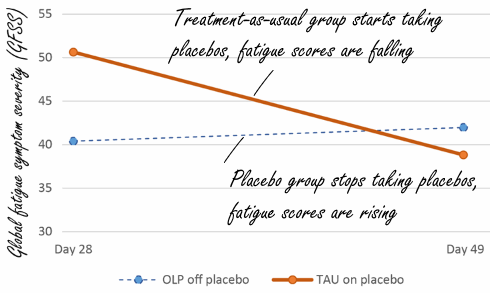
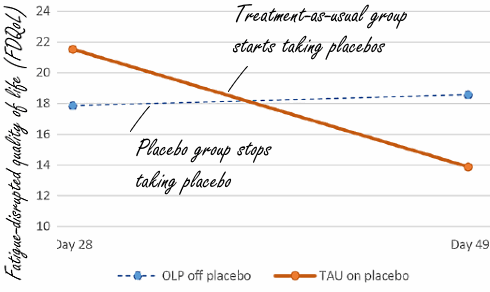
Conclusie
"Fooling or deceiving patients may be unnecessary for placebo effects to produce benefits, with automatic neurological processes being a possible mechanism for the effects. This has revolutionary implications for how we might exploit the power of placebo effects in clinical practice."
"Cancer survivors report that fatigue is their most distressing symptom, even more distressing than other symptoms like nausea or pain, and clinicians struggle to find ways to help them with it. The effects of the placebo pills on fatigue were so dramatic that we had a number of the study patients ask if they could be given more placebo pills. For ethical reasons, we were unable to do so."
"Participants still had benefits three weeks after they stopped taking the placebo pills, which hasn't been shown before", zegt co-auteur Kevin Fontaine in hetzelfde persbericht. "The extension of benefits even when the placebo pills are discontinued has been a surprise finding that has many placebo researchers excited."
Bron:
Sci Rep. 2018 Feb 9;8(1):2784.
Meer:
Een placebo werkt ook als je weet dat je een placebo slikt (11-07-2015)
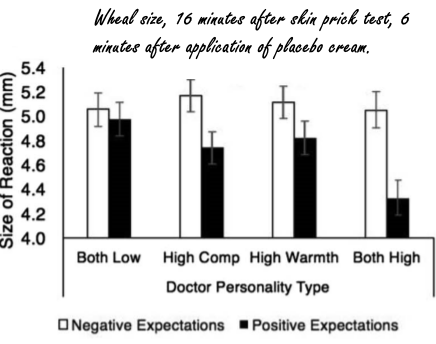 |
 |
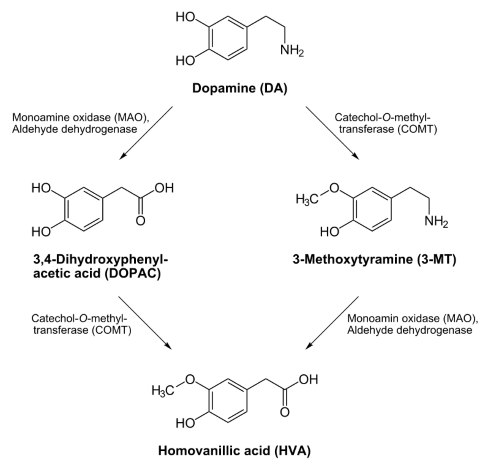 |
|
Intermenselijke warmte en competentie versterken het placebo-effect De placebowerking draagt bij aan het effect van voeding, supplementen, lichaamsbeweging - en medicijnen. In ieder geval medicijnen worden effectiever als de arts die ze verstrekt zich zowel competent als warm en betrokken opstelt. |
Het placebo-effect maakt beweging nog gezonder Lichaamsbeweging is pyschologisch gezond. Het vermindert vermoeidheid, en beschermt tegen werkstress en burnout. Volgens Duitse psychologen worden al die effecten sterker naarmate je er meer in gelooft. |
Placebowerking sterker als er veel dopamine in je hersenen zit Als jij je goed kunt concentreren en jezelf goed kunt motiveren, dan circuleert er waarschijnlijk veel dopamine in de voorste delen van je hersenen. Dik kans dat dat komt omdat je een lui COMT-gen hebt. Dan reageer je waarschijnlijk ook goed op placebo's. |